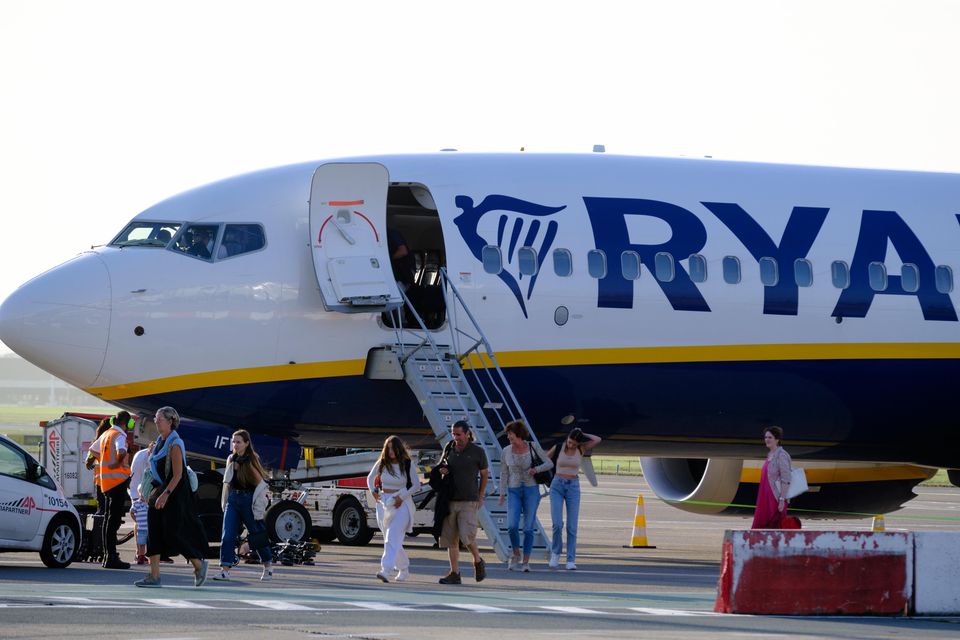Ryanair shares tumble after online travel agents stop selling its tickets
Photo: Getty
Online travel agents including Booking.com stopped offering Ryanair flights early last month in a move the airline said will reduce its load factors by between 1pc and 2pc for December and January.
But the carrier has insisted the removal of its flights from the online travel agent (OTA) systems will not materially impact its full-year passenger traffic projections or expected profit after tax.
Today's News in 90 Seconds - January 3rd
However, it said it will lower fares to encourage more passengers to book tickets directly via its website. Its load factor is the percentage of available seats its sells on its flights.
“Ryanair will respond to this welcome removal of our flights from OTA pirate websites, by lowering fares where necessary to encourage all passengers to book directly on Ryanair.com,” according to the airline.
Shares in the airline had slumped 4pc by midday in Dublin.
Before the pandemic, online travel agents accounted for about 10pc of Ryanair’s ticket sales. By 2021, they accounted for 20pc, Ryanair group chief executive Michael O’Leary revealed that year.
Ryanair has been battling online travel agents for years in an effort to prevent them from engaging in so-called screen-scraping and reselling its flights to customers via their own websites.
The airline has secured a number of legal victories against online travel agents and is currently fighting a major lawsuit in the US against Booking Holdings and its subsidiaries, including Kayak and Booking.com.
Ryanair has also introduced a number of measures that have forced passengers who made bookings via online travel agents to verify their identity. The red tape is likely to discourage people from buying Ryanair flights via third-party websites.
“In early December, most of the larger online travel agent pirates suddenly removed Ryanair’s flights from sale on their websites,” noted Ryanair on Wednesday.
“This welcome removal may be the result of pressure from consumer protection agencies or a response to the recent Irish High Court ruling, which granted Ryanair a permanent injunction against screenscraper Flightbox from unlawfully scraping Ryanair.com content for OTA’s, or in response to Ryanair’s KYP (Know Your Passenger) customer initiatives such as verification,” according to the airline.
“While these OTA pirates only account for a small fraction of Ryanair’s bookings, we expect the sudden removal of our flights from these OTA websites to reduce short term load factors by 1pc or 2pc in December and January and also to soften short term yields as we respond by making more low fares available directly to consumers,” it added.
Ryanair expects to post a profit after tax of up to €2.05bn for its financial year that ends in March.
Last month, Ryanair claimed that Booking.com was partly responsible for a recent “malicious attack” on the airline’s payment processing platform between September and October.
Lawyers for Booking.com had described the allegation of a cyber-attack as “baseless” and “far-fetched”.
“The allegations are baseless and refuted by Booking Holdings and Booking.com,” said a spokesperson for the group.
As part of a now long-running legal battle launched in the US in 2020 by Ryanair against Booking Holdings and its subsidiaries, the airline has claimed that the attack on the Monex system happened at the end of September and persisted through the start of October. Monex is owned by Kerry-based Monex Financial Services.
Ryanair has sued Booking.com and its subsidiaries including Kayak, Agoda and Priceline for alleged screen-scraping of its fares.
“Around the height of the attack, on October 5 and 6, 2023, Booking’s website was not displaying Ryanair flights, suggesting a connection between the attack and Booking,” Ryanair claimed in court documents filed in the US.
Lawyers for Booking Holdings and its subsidiaries have strenuously denied claims that Booking.com was in any way involved in the incident.
“Without any evidence that Booking.com knew about or had any role directing this attack, Ryanair attempts to pin this event ‘in part’ on Booking.com based on nothing more than speculation and inference,” they have told the court.
Join the Irish Independent WhatsApp channel
Stay up to date with all the latest news















